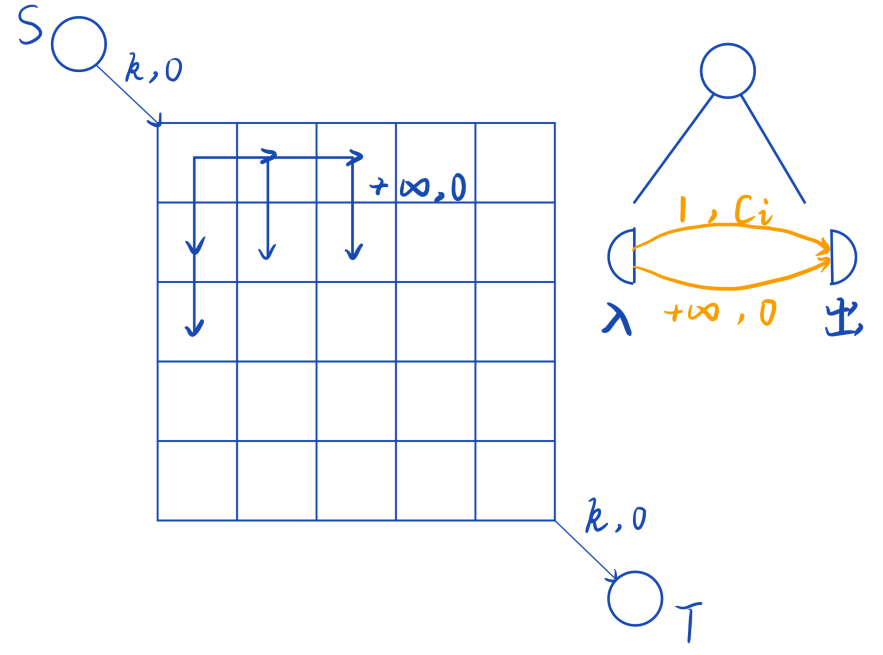K取方格数
每个点可以走无限次,但只有一次有权值,考虑拆点,在入点和出点间建立两条边,只有一条有权值
- 从虚拟源点向左上角的点连一条容量为 (k) 费用为 (0) 的边
- 从右下角的点向虚拟汇点连一条容量为 (k) 费用为 (0) 的边
- 从当前点向下方和右方的点连一条容量为 (+infty) 费用为 (0) 的边
- 从每个点的入点到出点连一条容量为 (1) 费用为 (c_i) 的边
- 从每个点的入点到出点连一条容量为 (+infty) 费用为 (0) 的边
每个方案和最大可行流一一对应, 求最大费用最大流即可
#include <bits/stdc++.h>
using namespace std;
const int N = 50 * 50 * 2 + 10;
const int M = (50 * 50 * 4 + 10) * 2;
const int INF = 1e9;
int n, k, S, T;
struct Edge
{
int to, nxt, flow, w;
}line[M];
int fist[N], idx;
int d[N], pre[N], incf[N];
bool st[N];
void add(int x, int y, int z, int w)
{
line[idx] = {y, fist[x], z, w};
fist[x] = idx ++;
line[idx] = {x, fist[y], 0, -w};
fist[y] = idx ++;
}
bool spfa()
{
queue<int> q;
memset(d, -0x3f, sizeof d);
memset(incf, 0, sizeof incf);
q.push(S), d[S] = 0, incf[S] = INF;
while(!q.empty())
{
int u = q.front(); q.pop();
st[u] = 0;
for(int i = fist[u]; i != -1; i = line[i].nxt)
{
int v = line[i].to;
if(line[i].flow && d[v] < d[u] + line[i].w)
{
d[v] = d[u] + line[i].w;
pre[v] = i;
incf[v] = min(line[i].flow, incf[u]);
if(!st[v])
{
q.push(v);
st[v] = 1;
}
}
}
}
return incf[T] > 0;
}
int EK()
{
int cost = 0;
while(spfa())
{
int t = incf[T];
cost += t * d[T];
for(int i = T; i != S; i = line[pre[i] ^ 1].to)
{
line[pre[i]].flow -= t;
line[pre[i] ^ 1].flow += t;
}
}
return cost;
}
int get(int x, int y, int t)
{
return (x * n + y) * 2 + t;
}
int main()
{
scanf("%d%d", &n, &k);
S = n * n * 2, T = n * n * 2 + 1;
memset(fist, -1, sizeof fist);
add(S, get(0, 0, 0), k, 0);
add(get(n - 1, n - 1, 1), T, k, 0);
for(int i = 0; i < n; ++ i)
for(int j = 0; j < n; ++ j)
{
int c;
scanf("%d", &c);
add(get(i, j, 0), get(i, j, 1), 1, c);
add(get(i, j, 0), get(i, j, 1), INF, 0);
if(i + 1 < n) add(get(i, j, 1), get(i + 1, j, 0), INF, 0);
if(j + 1 < n) add(get(i, j, 1), get(i, j + 1, 0), INF, 0);
}
printf("%d
", EK());
return 0;
}
志愿者招募
无源汇上下界最小费用可行流
#include <bits/stdc++.h>
using namespace std;
const int N = 1000 + 10;
const int M = (N * 2 + 10000 + 10) * 2;
const int INF = 1e9;
int n, m, S, T;
struct Edge
{
int to, nxt, flow, w;
}line[M];
int fist[N], idx;
int d[N], pre[N], incf[N];
bool st[N];
void add(int x, int y, int z, int w)
{
line[idx] = {y, fist[x], z, w};
fist[x] = idx ++;
line[idx] = {x, fist[y], 0, -w};
fist[y] = idx ++;
}
bool spfa()
{
queue<int> q;
memset(d, 0x3f, sizeof d);
memset(incf, 0, sizeof incf);
q.push(S), d[S] = 0, incf[S] = INF;
while(!q.empty())
{
int u = q.front(); q.pop();
st[u] = 0;
for(int i = fist[u]; i != -1; i = line[i].nxt)
{
int v = line[i].to;
if(line[i].flow && d[v] > d[u] + line[i].w)
{
d[v] = d[u] + line[i].w;
pre[v] = i;
incf[v] = min(line[i].flow, incf[u]);
if(!st[v])
{
q.push(v);
st[v] = 1;
}
}
}
}
return incf[T] > 0;
}
int EK()
{
int cost = 0;
while(spfa())
{
int t = incf[T];
cost += t * d[T];
for(int i = T; i != S; i = line[pre[i] ^ 1].to)
{
line[pre[i]].flow -= t;
line[pre[i] ^ 1].flow += t;
}
}
return cost;
}
int main()
{
scanf("%d%d", &n, &m);
S = 0, T = n + 2;
memset(fist, -1, sizeof fist);
int last = 0;
for(int i = 1; i <= n; ++ i)
{
int c;
scanf("%d", &c);
if(last > c) add(S, i, last - c, 0);
else if(last < c) add(i, T, c - last, 0);
add(i, i + 1, INF - c, 0);
last = c;
}
add(S, n + 1, last, 0);
for(int i = 1; i <= m; ++ i)
{
int a, b, c;
scanf("%d%d%d", &a, &b, &c);
add(b + 1, a, INF, c);
}
printf("%d
", EK());
return 0;
}
